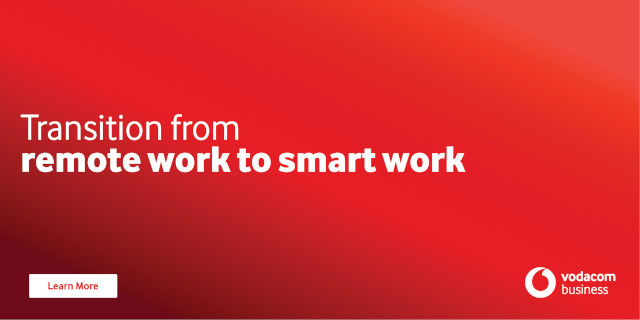Business News sponsored by Vodacom Transformation of Work:
The African youth of today will become the world’s future workforce. The continent is home to the fastest-growing youth population in the world. Statistics also show that the region’s technological competitiveness is growing, particularly in countries such as Nigeria, Kenya, Ghana and South Africa.
This is happening at the same time as some of the world’s most technologically advanced countries, such as Japan, face the challenge of an ageing population. It is therefore important to equip African youth and workers with the skills necessary to be part of this future workforce.
Technology is already doing this. In fact, it is democratising entry into industries such as insurance, computer science and healthcare. Previously, people would have had to study for long degrees to enter into these industries but can do so more readily today thanks to the way technologically is changing how we learn, what we learn and where we learn.
Essential ICT skills training
Noluthando Madzivhe, Talent Development Manager at Huawei SA, speaks passionately about the transformative role of technology in bridging the skills gap and opening up new opportunities for Africa's burgeoning youth population and the urgency to equip African youth with the necessary tech skills to thrive in the future global workforce.
Huawei, Madzivhe notes, is at the forefront of this transformative agenda through its ICT Academy and various skills development and training programmes. These initiatives are meticulously designed to shorten the learning curve traditionally associated with entering high-demand sectors such as insurance, computer science, and healthcare. By providing accessible and practical tech education, Huawei is not just preparing individuals for the job market but is fundamentally altering the landscape of industry entry, making it more inclusive and equitable.
As Andrew Bourne, Regional Head, Africa at Zoho believes, “the right tech tools, at the right price can support digital literacy and develop the ICT skills South Africa needs”.
In fact, says Bourne, “we need to future-proof children so that they are equipped to apply for jobs that require digital and development skills”.
“With low-code platforms, for example, citizen developers can create complex and powerful business applications without requiring costly and lengthy training. Most low-code application development can be managed with users who only have moderate technical knowledge,” he adds.
Soft skills training
“With a vast range of skills required within the broader tourism sector, there is a great opportunity for youth and especially young women to forge careers in the industry. Career openings exist across a number of disciplines from accommodation to marketing,and many other diverse products and services,” says Genevie Langer, Marketing Manager at Radisson Blu Hotel Waterfront.
An important but often overlooked skill is creativity. This includes creative problem solving, but also the use of design tools and learning how to come up with creative campaign ideas. These skills can be learned at virtually any stage of a person’s career but are best learned early.
There are several platforms for creative skills training, including Udemy and Canva. The tourism sector has the capacity to absorb a large number of employees, some positions with low barriers to entry, making it an ideal choice for school leavers and first jobbers. It is unique in that it also offers young people the opportunity to learn ‘on the job’ and to progress through the ranks to a managerial position.
Gail Odgers, Head of Acquisition at Sportingbet says that mentorship and coaching forms a critical role in providing access to career opportunities: “It’s important for systems to be put in place that facilitate mentorship, learning opportunities and skills development for women and this needs to be a continuous process. Also, soft skills development and engagement leveraging industry updates, coaching, and engaging with other women in the industry at conferences.”
Innovation, Self-service and AI training
Self-service has disrupted the banking industry by providing consumers with the ability to open investment products, save and manage their finances at the touch of a button without having to be assisted by a banking professional. This is becoming the case in the insurance industry, where insurtech is democratising access to a range of insurance products for consumers and businesses without the use of an in-person broker through tools such as artificial intelligence (AI) and machine learning (ML).
According to Deloitte’s Africa Insurance Outlook 2022 insurers can provide customers with streamlined, deliberate and individualised customer offerings through digitisation and the adoption of emerging technologies.
Vis Govender, Group CEO at First Equity Group and Co-Founder at Everything.Insure comments on the value of AI and machine learning skills training, saying that “by using technologies such as AI, machine learning, and data analysis, insurtech is enabling the creation of insurance products with intelligent underwriting that are more competitively priced, empowering consumers with the ability to make changes to their insurance plans or submit a claim anywhere at any time, and facilitating the ability to stop and start their insurance plan based on when they need it and when they don’t”.
Ursula Fear, Salesforce senior talent programme manager, says that while we need AI specialists to help solve local technology challenges, we need to ensure that these specialists are empowered to implement rapidly, monitor, and ensure best security practices when it comes to AI. “The world is moving towards one in which AI will be pervasively integrated into business systems and processes. With that comes an increased risk of cyber-attacks, and the future will require knowledgeable IT professionals who can implement solutions, especially if South Africa is to be globally competitive,” says Fear.
Huawei SA’s Noluthando Madzivhe highlights the broader implications of opening access to education and training, saying, “by empowering African youth with cutting-edge tech skills, we are contributing to the continent's ability to compete on the global stage. The focus on practical, technology-driven education ensures that the workforce of tomorrow is not only equipped to meet the demands of the future but also to innovate and lead in the digital world”.






